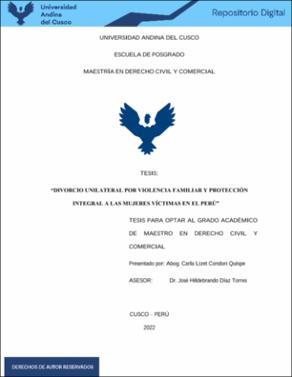| dc.contributor.advisor | Díaz Torres, José Hildebrando | |
| dc.contributor.author | Condori Quispe, Carla Lizet | |
| dc.date.accessioned | 2023-04-13T20:04:10Z | |
| dc.date.available | 2023-04-13T20:04:10Z | |
| dc.date.issued | 2022-11-22 | |
| dc.identifier.uri | https://hdl.handle.net/20.500.12557/5360 | |
| dc.description.abstract | La presente investigación tuvo por objetivo general, establecer los fundamentos que justifican
legislar el divorcio unilateral por violencia familiar en el Perú para garantizar la protección integral
de las mujeres víctimas; se postuló como hipótesis general, que, es necesario legislar el divorcio
unilateral por violencia familiar en el Perú, para garantizar la protección integral de las mujeres
víctimas, debido a que existe un alto nivel de riesgo en mujeres casadas que viven sometidas a los
actos violentos que perciben por su agresor; dentro del desarrollo de la investigación se analizó la
teoría referida al divorcio unilateral por causal de violencia familiar dentro de un proceso especial.
La investigación fue cualitativa documental, la discusión de los resultados se realizó a través de la
argumentación jurídica. Mi hipótesis fue validada, a consecuencia de ello mi conclusión principal
es que, los fundamentos que justifican legislar el divorcio unilateral por violencia familiar en el
Perú, se basa en un matrimonio conflictivo, donde la violencia transgrede los derechos de las
mujeres que son víctimas, por la cual, a través del divorcio unilateral, el Estado ofrecerá garantías
a las mujeres víctimas de violencia, considerando además los principios establecidos en la Ley N°
30364 las cuales se justifican sobre todo en la intervención inmediata y oportuna, sencillez y en
los principios de razonabilidad y proporcionalidad; logrando así un resultado más expeditivo;
asimismo, la recomendación fundamental está dirigida al Poder Legislativo, en el sentido de
implementar una norma especial para reforzar los objetivos de la Ley 30364, en base a los
fundamentos expuestos, para otorgar la protección integral al grupo de mujeres casadas víctimas
de violencia familiar, generando un menor costo al Estado y eliminando el desarrollo del proceso
ordinario del divorcio. | es_PE |
| dc.description.abstract | The general objective of this research was to establish the foundations that justify legislating
unilateral divorce due to family violence in Peru to guarantee the comprehensive protection of
female victims; In this sense, it was postulated as a general hypothesis that it is necessary to
legislate unilateral divorce due to family violence in Peru, to guarantee the integral protection of
female victims, due to the fact that there is a high probability of risk in married women who live
with their husband. aggressor and are subjected to perceive violence; Within the development of
the investigation, the theory referred to unilateral divorce due to family violence was analyzed
within a special process. The research was qualitative documentary, the discussion of the results
was carried out through legal argumentation. My hypothesis was validated, as a result of which
my main conclusion is that the grounds that justify legislating unilateral divorce due to family
violence in Peru are based on a conflictive marriage, where violence violates the rights of women
who are victims, for which, through unilateral divorce, the State will offer guarantees to women
victims of violence, also considering the principles established in Law No. 30364 which are
justified above all in the immediate and timely intervention, simplicity and in the principles of
reasonableness and proportionality; thus achieving a more expeditious result; Likewise, the
fundamental recommendation is addressed to the Legislative Power, in the sense of implementing
a special rule to reinforce the objectives of Law 30364, based on the exposed foundations, to grant
comprehensive protection to the group of married women victims of family violence, generating
a lower cost to the State and eliminating the development of the ordinary divorce process. | en_US |
| dc.format | application/pdf | es_PE |
| dc.language.iso | spa | es_PE |
| dc.publisher | Universidad Andina del Cusco | es_PE |
| dc.rights | info:eu-repo/semantics/restrictedAccess | es_PE |
| dc.rights.uri | https://creativecommons.org/licenses/by-nc-nd/4.0/ | es_PE |
| dc.subject | Divorcio unilateral | es_PE |
| dc.subject | Violencia familiar | es_PE |
| dc.subject | Protección integral a víctimas | es_PE |
| dc.title | Divorcio unilateral por violencia familiar y protección integral a las mujeres víctimas en el Perú | es_PE |
| dc.type | info:eu-repo/semantics/masterThesis | es_PE |
| thesis.degree.name | Maestra en Derecho Civil y Comercial | es_PE |
| thesis.degree.grantor | Universidad Andina del Cusco. Escuela de Pos Grado | es_PE |
| thesis.degree.discipline | Derecho Civil y Comercial | es_PE |
| dc.publisher.country | PE | es_PE |
| dc.subject.ocde | https://purl.org/pe-repo/ocde/ford#5.05.00 | es_PE |
| renati.advisor.dni | 23956366 | |
| renati.advisor.orcid | https://orcid.org/0000-0002-9869-3057 | es_PE |
| renati.author.dni | 46997964 | |
| renati.discipline | 422087 | es_PE |
| renati.juror | Rios Mayorga, Julio Trinidad | |
| renati.juror | Rivero Ynfantas, Fernando | |
| renati.juror | Castro Cuba Barineza, Isaac Enrique | |
| renati.juror | Mercado Espejo, Ivonne | |
| renati.level | https://purl.org/pe-repo/renati/level#maestro | es_PE |
| renati.type | https://purl.org/pe-repo/renati/type#tesis | es_PE |



